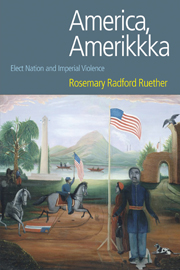Book contents
- Frontmatter
- Dedication
- Contents
- Introduction: THE TWO FACES OF AMERICA: THE IDEAL AMERICA AS DECEPTION AND AS PROTEST
- Chapter One ELECT NATIONS OF EUROPE AND THE MAKING OF THE AMERICAN MYTH OF CHOSENNESS
- Chapter Two THE RIGHTS OF MAN AND THE EXCLUDED OTHERS — THE REVOLUTIONARY ERA AND BEYOND
- Chapter Three MANIFEST DESTINY AND ANGLO-SAXON RACISM — 1815-1875
- Chapter Four MANIFEST DESTINY AND AMERICAN EMPIRE: 1890-1934
- Chapter Five AMERICA'S GLOBAL MISSION: THE COLD WAR ERA, 1945-89
- Chapter Six AMERICAN EMPIRE AND ITS DENOUEMENT: 1990-2007
- Chapter Seven ALTERNATIVE VISIONS OF AMERICA: THE PROTEST TRADITION
- Chapter Eight TOWARD A U.S. THEOLOGY OF LIBERATION AND LETTING GO
- BIBLIOGRAPHY
- INDEX OF BIBLICAL REFERENCES
- GENERAL INDEX
Chapter Eight - TOWARD A U.S. THEOLOGY OF LIBERATION AND LETTING GO
- Frontmatter
- Dedication
- Contents
- Introduction: THE TWO FACES OF AMERICA: THE IDEAL AMERICA AS DECEPTION AND AS PROTEST
- Chapter One ELECT NATIONS OF EUROPE AND THE MAKING OF THE AMERICAN MYTH OF CHOSENNESS
- Chapter Two THE RIGHTS OF MAN AND THE EXCLUDED OTHERS — THE REVOLUTIONARY ERA AND BEYOND
- Chapter Three MANIFEST DESTINY AND ANGLO-SAXON RACISM — 1815-1875
- Chapter Four MANIFEST DESTINY AND AMERICAN EMPIRE: 1890-1934
- Chapter Five AMERICA'S GLOBAL MISSION: THE COLD WAR ERA, 1945-89
- Chapter Six AMERICAN EMPIRE AND ITS DENOUEMENT: 1990-2007
- Chapter Seven ALTERNATIVE VISIONS OF AMERICA: THE PROTEST TRADITION
- Chapter Eight TOWARD A U.S. THEOLOGY OF LIBERATION AND LETTING GO
- BIBLIOGRAPHY
- INDEX OF BIBLICAL REFERENCES
- GENERAL INDEX
Summary
In 1977, Sister Marie Augusta Neal wrote a short book called A Socio-Theology of Letting Go. This book made a strong impression on me since it seemed to articulate the other side of a liberation theology, the side of a liberation theology addressed to those who are holding oppressive power over others. For those who are oppressed to be liberated, those who hold oppressive power must ‘let go’ (or must be made to let go), must relax their grip on domination and so others can go free. Ultimately a transformation of both sides must take place so there is no more poor and rich, oppressed and oppressors, elect and non-elect, privileged and nonprivileged, but a new society where all members enjoy dignity and access to the basic means of life. This is the ‘civilización de pobreza’ which martyred Jesuit theologian Ignacio Ellacuría spoke about in the last years of his life, a phrase which might be translated a ‘civilization of simple living.’
In this concluding chapter I will articulate something of what a theology of letting go might mean for North American power-holders, which would also be a theology of liberation, not only for dominated and impoverished peoples of countries victimized by the rich and powerful of the United States, but also for the vast majority of the people of the United States itself.
- Type
- Chapter
- Information
- America AmerikkkaElect Nation and Imperial Violence, pp. 250 - 275Publisher: Acumen PublishingPrint publication year: 2007



